
Glynis Margaret Payne Johns was a British actress. In a career spanning seven decades on stage and screen, Johns appeared in more than 60 films and 30 plays. She received various accolades throughout her career, including a Tony Award and a Drama Desk Award as well as nominations for an Academy Award, a Golden Globe Award, and a Laurence Olivier Award. She was one of the last surviving stars from the Golden Age of Hollywood and classical years of British cinema.

Lynne Ramsay is a Scottish film director, writer, producer, and cinematographer best known for the feature films Ratcatcher (1999), Morvern Callar (2002), We Need to Talk About Kevin (2011), and You Were Never Really Here (2017).

Factory Girl is a 2006 American biographical film directed by George Hickenlooper. It is based on the rapid rise and fall of 1960s underground film star and socialite Edie Sedgwick, known for her association with the artist Andy Warhol.

Terence Ivor Grant Morgan was an English actor in theatre, cinema and television. He played many "villain" roles in British film but is probably best remembered for his starring role in the TV historical adventure series Sir Francis Drake.

Quartet is a 1948 British anthology film with four segments, each based on a story by W. Somerset Maugham. The author appears at the start and end of the movie to introduce the stories and comment about his writing career. It was successful enough to produce two sequels, Trio (1950) and Encore (1951), and popularised the compendium film format, leading to films such as O. Henry's Full House in 1952.
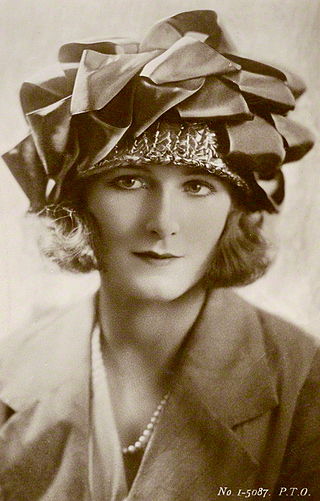
Heather Thatcher was an English actress in theatre and films.

Gertrude Olmstead was an American actress of the silent era. She appeared in 56 films between 1920 and 1929. Her last name was sometimes seen as Olmsted.

Trio is a 1950 British anthology film based on three short stories by W. Somerset Maugham: "The Verger", "Mr Know-All" and "Sanatorium". Ken Annakin directed "The Verger" and "Mr Know-All", while Harold French was responsible for "Sanatorium".
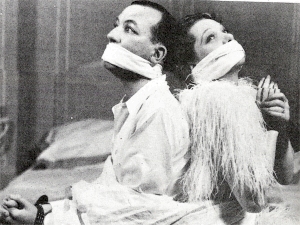
Ways and Means is a short comic play by Noël Coward, one of ten that make up Tonight at 8.30, a cycle written to be performed across three evenings. The story concerns an heiress and her gambling husband, who are plagued by debt and embarrassment as everything seems to always go wrong for them. Their honour is saved just in time when a disgraced chauffeur tries to rob them but amiably ends up pulling them out of a hole.
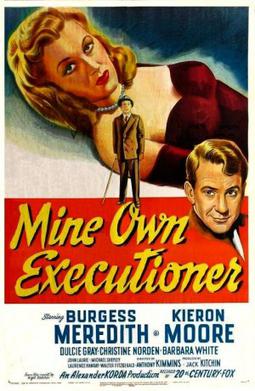
Mine Own Executioner is a 1947 British psychological thriller drama film starring Burgess Meredith and directed by Anthony Kimmins, and based on the novel of the same name by Nigel Balchin. It was entered into the 1947 Cannes Film Festival. The title is derived from a quotation of John Donne's "Devotions", which serves as an epigraph for the original book.

Our Betters is a 1933 American pre-Code satirical comedy film directed by George Cukor and starring Constance Bennett, Anita Louise and Gilbert Roland. The screenplay by Jane Murfin and Harry Wagstaff Gribble is based on the 1917 play of the same title by Somerset Maugham. Tommy Atkins worked as assistant director, while the sets were designed by the art director Van Nest Polglase.

The Card is a 1952 British comedy film version of the 1911 novel by Arnold Bennett. In America, the film was titled The Promoter. It was adapted by Eric Ambler and directed by Ronald Neame. It stars Alec Guinness, Glynis Johns, Valerie Hobson, and Petula Clark. The film was nominated for the Academy Award for Best Sound.

The Beachcomber is a 1954 British comedy drama film directed by Muriel Box starring Donald Sinden, Glynis Johns, Robert Newton, Paul Rogers, Donald Pleasence and Michael Hordern. The film is based on the 1931 short story "The Vessel of Wrath" by W. Somerset Maugham and was adapted by Sydney Box. It was the second screen adaptation of the book following the 1938 film Vessel of Wrath. The film was shot at Pinewood Studios and on location in Ceylon. The film's sets were designed by the art director George Provis.

Mary Merrall, born Elsie Lloyd, was an English actress whose career of over 60 years encompassed stage, film and television work.
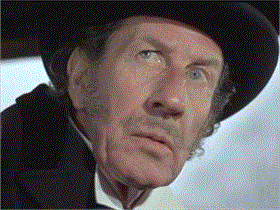
David Hutcheson was a British character actor. He made his film debut in Fast and Loose in 1930 and played his only lead role in 1934's Romance in Rhythm. He went on to specialise in hooray henrys, silly asses and military types most prominently in Michael Powell and Emeric Pressburger's The Life and Death of Colonel Blimp (1943) and Peter Ustinov's School for Secrets (1946) and Vice Versa (1948). He continued in film and television until the 1970s. During the 1960s he often played the role of Colonel Pickering in stage productions of My Fair Lady.

The Right to Live is a 1935 American drama film directed by William Keighley and starring Josephine Hutchinson, George Brent and Colin Clive. The film was shot at Warner Brothers's Burbank Studios, with sets designed by the art director Esdras Hartley.

The Mixture as Before is a collection of 10 short stories by the British writer W. Somerset Maugham, first published by William Heinemann in 1940.

The Small Bachelor is a 1927 American silent comedy film directed by William A. Seiter and written by John B. Clymer, Rex Taylor and Walter Anthony. It is based on the 1927 novel The Small Bachelor by P. G. Wodehouse. The film stars Barbara Kent, George Beranger, and William Austin. The film was released on November 6, 1927, by Universal Pictures. Carl Laemmle was the film's presenter.
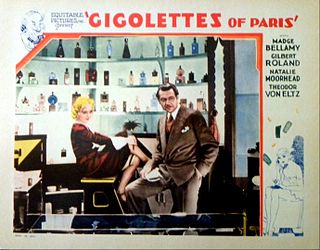
Gigolettes of Paris is a 1933 American movie written and directed by Alphonse Martell starring Madge Bellamy and Gilbert Roland featuring a A romance between a salesgirl, a wealthy count, and another man.
The playwright, novelist and short-story writer W. Somerset Maugham, was a prolific author from the late 19th century until the 1960s. Most of his earliest successes were for the theatre, but he gave up writing plays after 1932. Many of his plays have been adapted for broadcasting and the cinema, as have several of his novels and short stories. The New York Times commented in 1964, "There are times when one thinks that British television and radio would have to shut up shop if there were not an apparently inexhaustible supply of stories by Maugham to turn into 30-minute plays. One recalls, too, the long list of movies that have been made from his novels − Of Human Bondage, The Moon and Sixpence, The Painted Veil, The Razor's Edge and the rest.



















